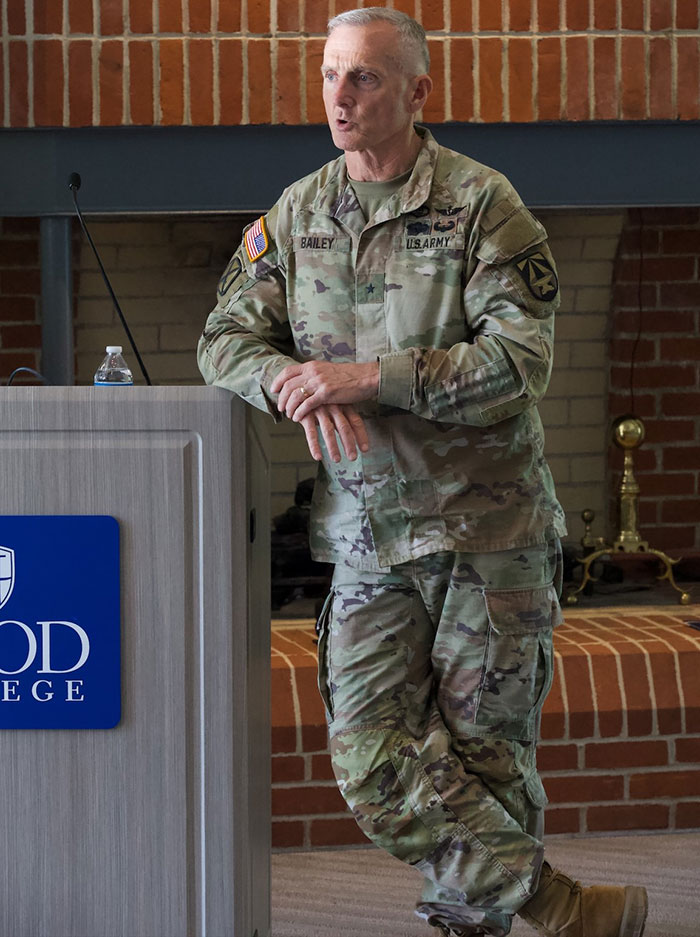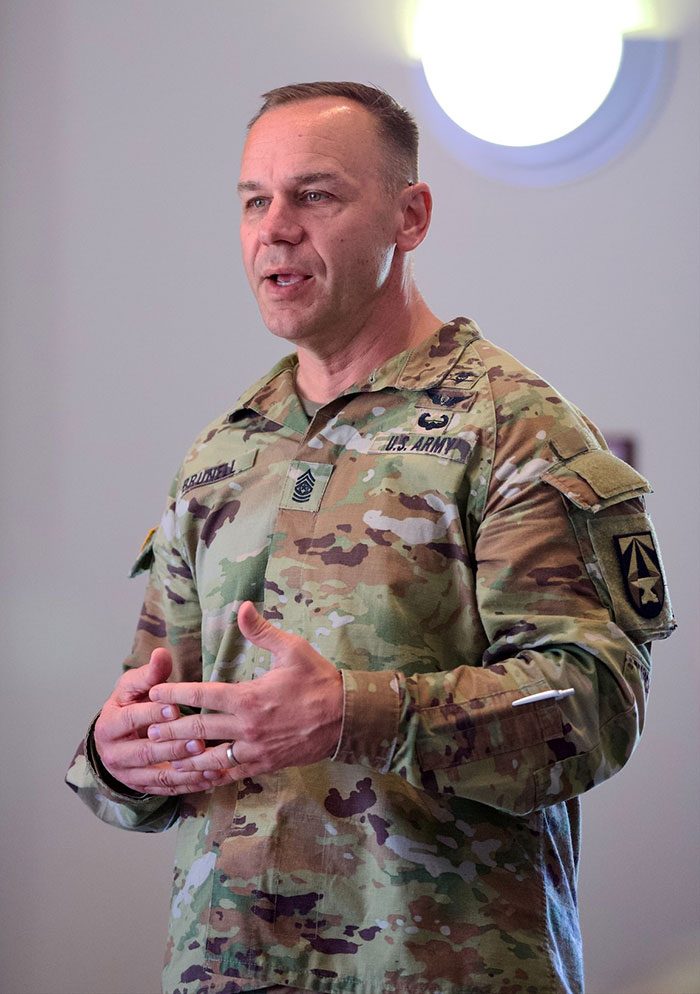Bailey, Brunell Talk Character with Hood College ROTC Cadets

FORT DETRICK, Md. — Hood College ROTC cadets had a unique opportunity to learn firsthand about the capabilities of the U.S. Army Medical Research and Development Command, career opportunities in Army medicine and the qualities of leadership April 16 during an informal presentation and discussion with Brig. Gen. Edward H. Bailey, commanding general of MRDC and Fort Detrick, and Command Sgt. Maj. Kyle S. Brunell.
A group of around 10 cadets from the Green Terror Battalion gathered in the main hall of Hood College's Whitaker Campus Center in Frederick to hear Bailey and Brunell share some of their hard-earned wisdom and seek their advice on how to be better officers during a conversation that covered topics as wide-ranging as relationship building, self-development, servant leadership and accountability. A common denominator to all these aspects of leadership, Bailey said, is character.
"Character is probably the most important thing you need to be successful," Bailey told the cadets. "Character really is just doing the right thing, and that's what allows you to influence people. At the end of the day, you want people to follow you even when you're not there."
Bailey explained that modeling good character doesn't end when you're off-duty.
"Remember, you're a role model," Bailey said. "You have no idea where you're going to run into your Soldiers. If you are out walking around being stupid, your Soldiers will see your bad behavior. It's a 24/7 responsibility."
The Green Terror Battalion consists of ROTC cadets from three Maryland college campuses: McDaniel College in Westminster, Mount St. Mary's University in Frederick and Hood College. Although the Battalion is spread among three campuses, there is strong camaraderie among the cadets when they come together for classes as well as training events such as the conversation with Bailey and Brunell.
During his talk, Bailey also emphasized the importance of maintaining physical, mental and spiritual fitness as a way to stay resilient in a demanding environment. He pointed out that sometimes, maintaining that fitness means simply knowing when to take a break.
"Let leadership know if you need to take a knee; there's nothing wrong with that," he said. "The problem is when you don't tell us, because then we think that you're just not showing up for work. Understand your own resiliency. We all have a breaking point."

Officers are stewards of the profession of arms, Bailey said, and as such they sometimes have to make tough calls about the people under their command for the good of the unit and the service. Those decisions should also be informed by character – both of the officer and of the teams they lead.
"You need to keep improving the profession, and if people don't belong in the profession, you need to help them understand where they belong," Bailey said. "That's a tough conversation. It doesn't have to be an angry conversation, and it doesn't have to mean that we necessarily separate someone early. But it does mean that we need to help people understand why it's not working and help them find another place where they can contribute."
Lastly, Bailey stressed to the cadets the importance of learning not to fear making mistakes.
"I don't care if people fail because that's how people learn," Bailey said. "You get back in and you go at it. So, constantly push yourself and keep learning. Be accountable."
During his remarks, Brunell amplified the importance of character to the cadets, beginning with a favorite quote.
"General Schwarzkopf, the king of strategy who used overwhelming force to win the first Gulf War in 1991, said, 'Leadership is a potent combination of strategy and character. But if you must be without one, be without strategy,'" Brunell said. "You want me to follow you? You've got to be worth following. And how do people know that you're worth following? By your character, by your trust and by knowing that you care."
Brunell said that one way to demonstrate those qualities is by making personal connections with the people you work with.
"I try to make time to sit down and talk," Brunell said. "I'll find a picture on a desk or on a wall, a diploma, something, and just ask them about it. You learn something important about them and they share an experience with you that makes them happy. It's a positive thing and you create relationships. When I know you care about me and when I know you're a person of character, I'll go out my way to make sure that you're successful. Character is the secret sauce."
"I'm way closer to the end of my career than the beginning, and as I look at you, I'm honestly jealous," Brunell said. "I can't wait to see what you are going to accomplish."
 An official website of the United States government
An official website of the United States government
 ) or https:// means you've safely connected to the .mil website. Share sensitive information only on official, secure websites.
) or https:// means you've safely connected to the .mil website. Share sensitive information only on official, secure websites.


